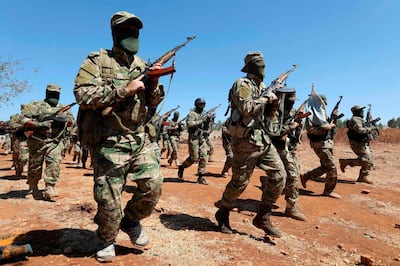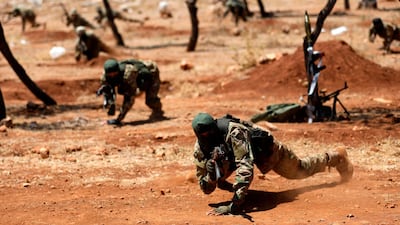The stage is set for confrontation in Idlib, as Syrian regime forces surround the last rebel bastion and a Russian naval fleet sits vigilant off the Mediterranean coast.
Exactly how the battle in the northern province will play out remains uncertain. But it is becoming increasingly clear that a day of reckoning is approaching for one of the most powerful militant groups in Syria — the former Al Qaeda-affiliate Hayat Tahrir Al Sham (HTS).
The group’s approximately 30,000 fighters control nearly two thirds of the province, and despite many attempts to rebrand and embed itself within the Syrian opposition, it stands alone and opposed by all the major powers with a stake in the civil war, facing its most serious threat to survival yet.
The Syrian government and its Russian allies have repeatedly used the presence of HTS to justify the impending offensive. As a result, the fate of more than 2.5 million civilians in Idlib is now inextricably linked to the descendant of Al Qaeda's Syrian offshoot.
The UN has said an offensive in Idlib would displace some 700,000 and create a humanitarian "catastrophe." An all-out attack to rout the group would also be disastrous for Turkey, which has a significant presence in Idlib and would likely shoulder the burden of large scale displacement.
As a result, Ankara has sought to delay an attack by trying to convince HTS to dissolve and join a coalition of Turkish-backed rebels. But the group’s leadership has resisted those calls, and instead vowed to fight on.
_________
Read more:
Syrian government flexes its might with sights on Idlib
Russia plans Mediterranean naval exercise to support Syria
As regime plans Idlib offensive, US warns Assad and Russia against chemical attack
Syrian regime shells Idlib ahead of assault
_________
“The weapons of the revolution and jihad ... are a red line on which concessions are unacceptable, and they will never be put on the negotiations table,” HTS chief Abu Mohamed Al Jolani said last month. “As soon as one of us thinks about negotiating over their weapons, they will have lost them,” he added in a video posted online.
In response, Turkey officially designated the group a terror organisation on Friday — joining the United States, the European Union and the UN in doing so. By dealing with HTS on its own, Ankara hopes it can delay a Russian and Syrian attack.
If that doesn’t work, Turkey could stand aside for a limited government offensive against HTS in return for the regime leaving Turkish presence in Idlib untouched for now.
But the prospects of isolating the group in the long-term are not good.
"HTS has positioned itself in such a way that it's seemingly impossible to come after it without a huge humanitarian cost and really grave damage to Turkish interests," Sam Heller, a senior analyst at Crisis Group, told The National.
"So even if all these interested parties want to neutralise HTS, there aren't a lot of obvious answers for how they can do it," he added.

The group now faces a choice to dissolve or fight on — either outcome would likely put an end the state-building ambitions of one of the most influential rebel groups of the Syrian civil war, whose fighters have been opposed and targeted by nearly every side of the conflict.
The group first emerged in early 2012 as the Al Nusra Front, an offshoot of Al Qaeda in Iraq. Its leadership was made up of veterans of the insurgency against the 2003 US invasion, who came to Syria with the eventual aim of establishing a caliphate.
Bolstered by foreign fighters from around the world who shared the same aim, it gained a reputation early on in the conflict as one of the fiercest fighting groups on the ground, with a singular focus on overthrowing Bashar Al Assad’s regime.
It used brutal methods, deploying suicide bombers and mercilessly targeting civilians in government. But it also put emphasis on durability, and sought to build a base of support among Syrians which it hoped would sustain it.
_________
Read more:
Bombing Idlib would be 'catastrophic' says Turkey Foreign Minister
Killings and abductions feed frustration in Syria's rebel-held Idlib
Comment: Idlib could be the endgame of the Syrian conflict
_________
In 2013, ISIS leader Abu Bakr Al Baghdadi attempted to merge Nusra with the ISIS in Iraq. But Jolani resisted, leading to a split between the two ideological allies.
In the following years, ISIS sought a quick path to a caliphate using extreme brutality and terror to carve out a territory that until recently spanned 34,000 square miles across Syria and Iraq.
Al Nusra, in its various forms, played a long game.
It ingratiated itself with more moderate rebel groups when it could benefit from such connections and attacked them when it couldn't. In 2015 they won a major victory by capturing the city of Idlib — the eponymous capital of the northern province. It set up local institutions and built the foundations of its own caliphate, often in the face of protests from locals.
The group underwent several forms of rebranding in an effort to prolong its survival and in 2016 announced a split from Al Qaeda’s global network. Those efforts were largely unsuccessful, however, and it remains a key target of US and Russian airstrikes.
Today, with most other rebel groups defeated, HTS has positioned itself as the last independent opposition to Bashar Al Assad’s rule. But with enemy forces at its gates, it is unlikely the group will survive in its current form.
"Jolani's leadership is managing tensions with Turkey-backed groups on the one hand and Al Qaeda aligned hardliners on the other. Both are trying to poach fighters from him,” said Aron Lund, a fellow with The Century Foundation think tank.
“Keeping HTS going without tipping over in one of these directions seems like hard work. But ultimately I think HTS will have to bend or break with Turkish decisions, and Turkey's calculus will be more influenced by Russia than by rebels.”

